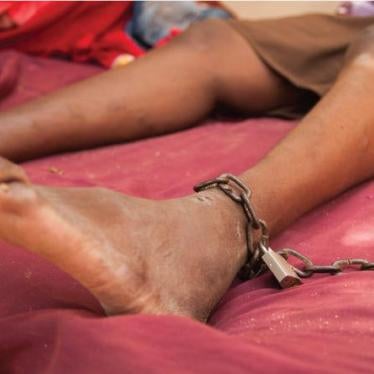The documentary film, Music by Prudence, tells the story of a young Zimbabwean woman born with a congenital disease that twisted her body and led to the amputation of her legs. Prudence Mabhena was abandoned by her family and shunned by her community, yet through music, she found a way to share her story and advocate for change. In February, the film won an Oscar and Prudence became a national hero.
It would be nice to say that Prudence's story provides a human face for persons with disabilities, a majority of whom - over 80 percent of the world's 680 million or more persons with disabilities - live in developing nations. Certainly, the challenges faced by Prudence - stigma and discrimination, abandonment, barriers to education and health care - are often faced by persons with disabilities worldwide and are made even more difficult in impoverished countries that lack infrastructure and many services. Unfortunately her triumph is uncommon.
Today we celebrate the second anniversary of a landmark in international law, the entry into force of the Convention on the Rights of Persons with Disabilities (CRPD). But here is the real question: is there something to celebrate? Has much changed in the daily lives of persons with disabilities since this treaty was adopted at the United Nations? Sadly, I don't think so. So far the treaty has been signed by 145 countries and ratified by 85, which means it's now binding international law for nearly half the states of the world. The Convention has an ambitious aim of promoting the equal human rights and dignity of all persons with disabilities.
I emphasize the world "all" because an important power of the convention is its recognition of the broad community of individuals with disabilities - including those with physical, mental, sensory (such as individuals who are deaf, blind or deafblind) and intellectual disabilities, regardless of whether they live in rich countries or poorer countries, or are members of indigenous groups and other minorities. The treaty also applies to little people (or persons of short stature), albinos and people who are hard of hearing.
However ratifying the treaty and enacting strong national laws and policies is only the start to achieving equality. Ending discrimination involves breaking down the barriers that people with disabilities face on a daily basis. For example, despite the Americans with Disabilities Act (ADA), when Prudence was in New York City following the Oscars, she wasn't able to eat at many restaurants because they weren't accessible to persons with disabilities. Many people assume that making a place accessible for persons with disabilities would cost a lot and affect few, but accessible restaurants and other places of business are also helpful to the elderly and to those temporarily disabled by injury. More fundamentally, the systematic exclusion of any group from public places is simply wrong. In the same way that racially segregated lunch counters perpetuated social isolation, stigmatization and discrimination, excluding individuals with disabilities from the places where we eat, shop, and interact, results in the invisibility of those with disabilities, ignorance of their experiences, and, inevitably, bias.
In Zimbabwe, people with disabilities are considered cursed, and often sent to traditional healers who poke and prod their bodies in an effort to "cure" them of their disabilities. They are often marginalized and neglected. Prudence's magical voice allowed her to break through her isolation and exclusion. She was not alone in this struggle, overcoming this together with the other members of her band Liyana: Tapiwa Nyengera (keyboards; spina bifida); Energy Maburutse (marimba; osteogenesis imperfecta); Honest Mupatse (tenor marimba, hemophilia): Marvelous Mbulo (singer, MS); Vusani Vuma (bass marimba, hearing-impaired); Goodwell Nzou (drums, amputee); and Farai Mabhande (keyboards, arthrogryposis). The music of Liyana sends a clear message of how the lives of us all - abled and disabled - are enriched when the barriers that separate us are broken down.
Ultimately, change must come in society itself, in every-day interactions with people with disabilities and in recognizing that we are all human beings who deserve respect and dignity. In order for us to change the way we think about disability, we need to listen to the voices and perspectives of persons with disabilities themselves. Voices like that of Prudence.
----
For more information about the film, Music by Prudence, visit: http://www.musicbyprudence.com/
To hear more from organizations of persons with disabilities at the national, regional and international levels, visit the International Disability Alliance (http://www.internationaldisabilityalliance.org/)








